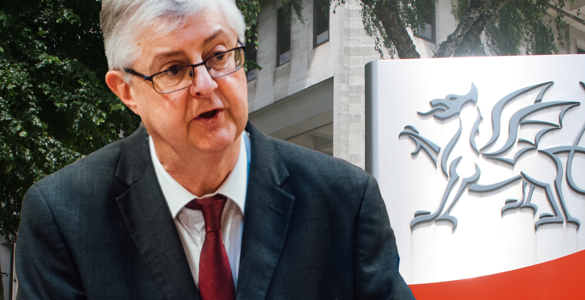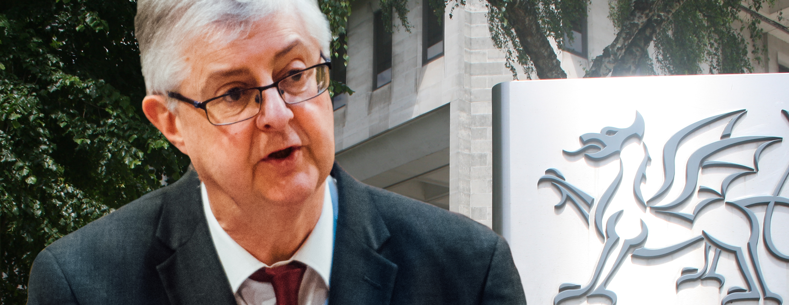This article was originally published in April 2022 and has been updated to reflect progress of the Senedd inquiry on mental health inequalities.
Anyone can struggle with their mental health. 1 in 4 of us will experience a mental health problem at some point in our lives.
However, statistics like this disguise the fact that some groups of people are at higher risk of poor mental health than others.
Vulnerable groups include people in poverty, ethnic minority communities, older people, children and young people, people who identify as LGBTQ+, and neurodivergent people among others.
Their mental health ‘risk’ is linked to inequalities in society – those who face disadvantage and discrimination are much more likely to experience mental health problems. The Senedd Health and Social Care Committee is looking at these mental health inequalities in Wales.
The Committee’s inquiry is looking at whose risk of mental ill health is higher and the barriers those groups face. It will also consider whether the Welsh Government’s existing policies do enough to recognise and address current needs.
‘Triple barrier’ of mental health inequality
The Centre for Mental Health describes a ‘triple barrier’ of mental health inequality, affecting people from different sections of the population.
This ‘triple barrier’ highlights that:
- Some groups of people are disproportionately at risk of poor mental health. This is often linked to wider inequalities in society.
- Groups with particularly high levels of poor mental health can have the most difficulty accessing services.
- When they do get support, their experiences and outcomes are often poorer.
These inequalities are not new, but the COVID-19 pandemic had a significant impact on people’s mental health and has made these existing inequalities worse.
The Committee is looking at these inequalities in the hope of driving change by influencing the Welsh Government and all sectors of society.
Supporting ethnic minority communities
People from ethnic minority communities can face racism and discrimination in their daily life, which can have a significant impact on their mental health and wellbeing.
Visiting the Ethnic Minorities & Youth Support Team Wales (EYST) in Swansea the Committee heard that people contacting EYST often face multiple challenges, and it can be difficult for staff to know which issue to address first.
For example, people may be experiencing problems with their health or housing, or barriers to education and employment, which negatively affect their mental health.
For staff working at the centre this often means having to provide services outside their core role due to lack of other service provision which meets the diverse needs of ethnic minority communities.
Providing translation or counselling for traumatic events can have an effect on staff, often making them relive their own traumatic experiences with consequences for their own mental health and wellbeing.
“Training opportunities just don’t exist”
Taking part in focus groups, people working in the health and social care sector told the Committee that they feel there is a lack of focus on training needs. Workforce pressures are such now that “training opportunities just don't exist anymore” as people can’t be released to attend. Some struggle to even do mandatory training.
They felt this is holding back crucial development of the workforce, particularly in supporting diverse communities.
A staff member said, “we've had a young person [from the transgender community] quite recently, and it highlighted how little awareness we have of the cultural issues within that particular community”.
“So, I think if you were to ask…how do you feel? How well equipped are you? I think they'd all say they would benefit from access to more training to be able to better support our patients and their families”
A report summarising what was heard from the health and social care workforce has been published on the Senedd website.
"Lack of strategic approach"
Responding to the public consultation Penny, who works with children with ADHD, told us that people with ADHD can feel alienated and rejected by society, leaving them vulnerable to depression and anxiety, particularly where the condition is undiagnosed or dismissed.
She feels that ADHD is not recognised as ‘the significant public health problem that it is’ and wants to see an overarching strategic approach from Welsh Government to develop policies in support of this.
What’s happened in the inquiry so far?
Earlier in the year, the Committee launched a public call for evidence.
More than 90 people and organisations responded, and almost 80 people with lived experience of mental health inequalities took part in focus groups.
Four themes emerged from the evidence and discussions. The Committee explored these in greater depth over the last few months by holding oral evidence sessions, engaging with the health and social care workforce and questioning Welsh Government Ministers.
The themes are:
- Mental health and society
The wider causes of mental ill health, and how the way we operate as a society can influence our mental health and wellbeing. - Community solutions
The role of communities in promoting and supporting mental health, including social prescribing. - The impact of mental health inequalities on people with neurodivergent conditions
Barriers experienced by this group, such as a lack of joined up services, limited awareness and training and diagnostic overshadowing, may also be experienced by other groups and communities. Looking at the experience of people with neurodiverse conditions will therefore also help the Committee understand broader themes that affect other groups. - Role of the healthcare and wider workforce
Looking at mental health and equality awareness across the healthcare workforce, including training, joined up working within the health service and other organisations. The role of GPs as the ‘front door’ to mental health services will also be looked at.
So that lived experience is at the heart of the inquiry an online advisory group has been set up to assist the Committee
The group includes people with lived experience of mental health inequalities and draws from the diverse communities of Wales. The role of the advisory group is to consider evidence heard by the Committee and provide feedback during the progress of the inquiry.
If you’re interested, the written responses to the public consultation and reports summarising the focus group findings have been published on the Senedd website. You can also watch all the Committee’s evidence sessions live and on demand on Senedd TV.
Want to follow the inquiry?
If you want to keep up with all the latest developments in the inquiry into Mental Health Inequalities you can:
- follow the inquiry on our website;
- keep up to date with our social media channels;
- subscribe to Senedd Research articles.
Although the inquiry is still ongoing, a report is expected from the Health and Social Care Committee that will present the evidence heard and outline what they want the Welsh Government to do to address mental health inequalities in Wales.
This report will be published on the Senedd website when it is available.




